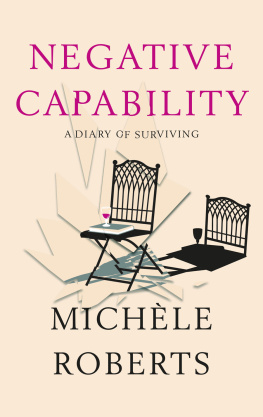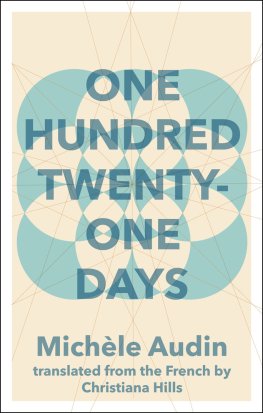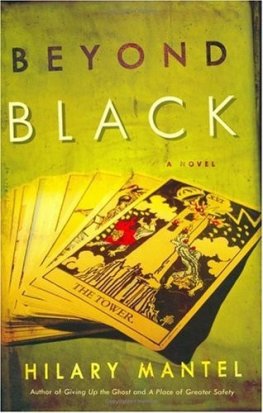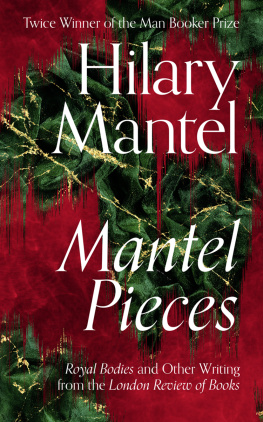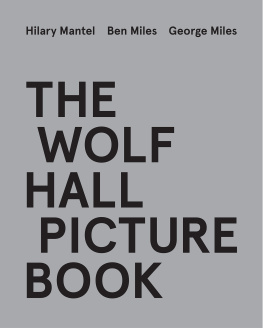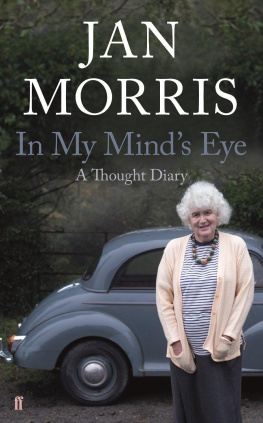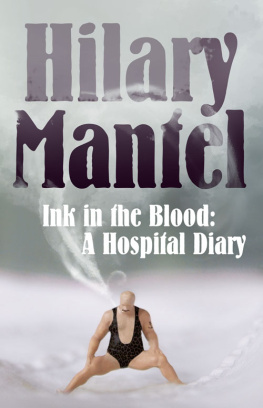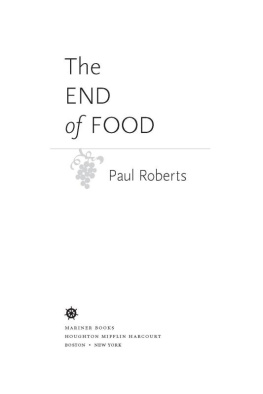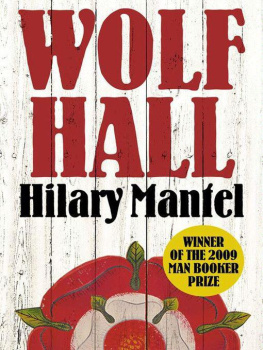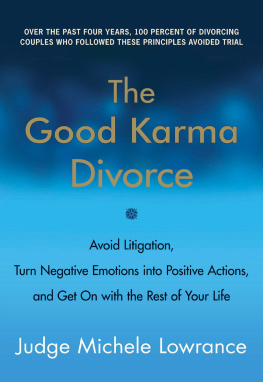
Michle Roberts is the author of fourteen critically acclaimed novels, including The Looking Glass and Daughters of the House , which won the WHSmith Literary Award and was shortlisted for the Booker Prize, and, most recently, the highly acclaimed Ignorance , which was longlisted for the Womens Prize for Fiction, 2013 and the Impac Award. Her memoir Paper Houses was a BBC Radio 4 Book of the Week. She has also published poetry and short stories, most recently collected in Mud: Stories of Sex and Love.
Half-English and half-French, Michle Roberts lives in London and in the Mayenne, France. She is Emeritus Professor of Creative Writing at the University of East Anglia and a Fellow of the Royal Society of Literature.
Also by Michle Roberts
NOVELS
A Piece of the Night
The Visitation
The Wild Girl
The Book of Mrs Noah
In the Red Kitchen
Daughters of the House
Flesh and Blood
Impossible Saints
Fair Exchange
The Looking Glass
The Mistressclass
Reader, I Married Him
Ignorance
The Walworth Beauty
SHORT STORIES
During Mothers Absence
Playing Sardines
Mud Stories of Sex and Love
POETRY
The Mirror of the Mother
Psyche and the Hurricane
All the Selves I Was
The Heretics Feast
The Hunters House
Swimming Through a Painting by Bonnard
Fifteen Beads
NON-FICTION
Food, Sex & God: on Inspiration and Writing
Paper Houses

First published in Great Britain by
Sandstone Press Ltd
Willow House
Stoneyfield Business Park
Inverness
IV2 7PA
Scotland
www.sandstonepress.com
All rights reserved.
No part of this publication may be reproduced,
stored or transmitted in any form without the express
written permission of the publisher.
Copyright Michle Roberts 2020
Editor: Moira Forsyth
The moral right of Michle Roberts to be recognised as the
author of this work has been asserted in accordance with the
Copyright, Designs and Patents Act 1988.
ISBN: 978-1-913207-14-4
ISBNe: 978-1-913207-15-1
Cover design by Nathan Burton
Ebook compilation by Iolaire, Newtonmore
To Sarah and Jenny.
Contents
APRIL
One Day In Orchard Street, London
Yesterday ended in disaster. Very late at night, I decided to write down everything that had happened, the only way I could think of coping. So here goes.
Yesterday I woke up at seven thirty in my white-painted wrought-iron bed, felt lazy, decided to have a lie-in. Almost immediately, above me, the neighbours bed began creaking. This went on for ten minutes or so, then stopped. Angus and Bettina got up and thumped to and fro on their wooden floor. I got up too. While coffee brewed, I went out into the back garden bearing yesterdays coffee grounds slug deterrent and slices of used lemon cat deterrent. The local cats like to shit in my flowerbeds and I like to swear at them, if I spot them, and chase them off. A dog fox ran along the bed at the far end. When I shouted at it and waved my arms it leaped the fence into my neighbour Mikes garden. I deadheaded a few primroses, admired the hellebores pale pink flowers, the violets and wallflowers in bloom, counted three spikes of lily-of-the-valley poking up and went back inside. I decided not to do yesterdays washing-up, left it still piled in the sink. I preferred to get down to work straight away.
Usually in the mornings I work on rewriting my novel, revising it line by line, page by page. I am determined to get it published, even though the Publisher rejected it several months ago, she and her reader finding it overall too intense too heavy though in part stupendous. Failing is part of writing, though not all writers admit to failing ever. Fail again, said Samuel Beckett: fail better. Accordingly, I had begun to rewrite the novel, expanding it, doubling it to inhabit two separate timescales, letting one strand of story haunt another.
Yesterday morning, however, I had a review to finish writing, so put my novel aside. I was in the middle of a spat with a friend, Susan, so felt pleased I had a commission to be getting on with, which might take my mind off hurt and anger. Nothing like work for giving back a lost sense of proportion.
Susan is younger than I am, beautiful, multi-talented, brave, cool. Recently, a particular piece of behaviour on her part had felt like a punch to the belly, knocking me off-balance. Id protested, trying to explain my upset. After that I kept silent. Not being in touch felt right; peaceful; a relief. I had then made the mistake of replying to an email from Susan gaily inviting us to meet. So now I was involved in an exchange of explanations. Part of me felt I had to see them through, that it might be worth it for the sake of the friendship, part of me felt Id been hooked back into something dodgy.
Thank heavens for deadlines. I went on with the work I had begun last night, the piece that I was due to send off this morning: a thousand words on Vera Brittains Testament of Youth . I drank strong Italian coffee from my big breakfast cup. Two cups of coffee every morning: a ritual, an addiction, a pleasure.
I wrestled with language for four hours, finding it pleasanter than wrestling with Susan. Writing about the language of Brittains memoir, her weird, conflicted style alternating between pomposity and succinct brilliance, I worked out what I thought about her treatment of her subject: war. Initially she seems to have wanted to join in, to have resented not being allowed to. After the deaths of her fianc and brother, the carnage she witnessed as a Red Cross volunteer nurse, she became a pacifist. Bravely she got on with the job: trying to patch up men smashed to red pulp. Brittains soldier patients had been forced to be brave on the battlefield, but now, in terrible pain, many of them lost control and screamed in wild abandonment.
Thinking about the soldiers suffering, I made a crass egotistical connection, remembered that I havent gone back to the dentist, because I havent yet screwed up sufficient courage. Last time, when Denis-the-dentist sprayed water into the tooth cavity, just washing it, the water jet hurt the sensitive tissue there and I screeched and jumped and the nurse put her gloved forefinger on my lower jaw to hold my mouth open and I wanted to clamp my mouth shut and of course couldnt or Id have bitten her. The pain and the helplessness combined with the rough whirring and grinding of the drill as Denis smoothed the edge of the newly fitted tooth, the drill clamped to me like a dog shaking its prey, revived the trauma of going to that sadist, Mr Watts, when I was young, as he drilled away with no local anaesthetic and often hit a nerve and I couldnt scream because he was still drilling. We had to go to Mr Watts for twelve years and for twelve years I lived in silent terror of the next visit, the next bout of pain. Unthinkable to complain, to ask to go to a different dentist who might not hurt us. We were drilled in obedience and then Mr Watts took over.
Jim, my ex-husband, knowing I feared dentists so much, had recommended Denis-the-dentists group practice: dont worry, Mimi, theyll sedate you for treatment if you ask them to, theyll knock you out cold. Handsome, burly Denis listened, on my first visit, when I tried to explain to him how scared I was. He said, yes, dentistry used to be medieval. He picked up my hand and studied my wet palm: look at you, sweating with terror just as Im about to inject you with the best drugs on the market!

